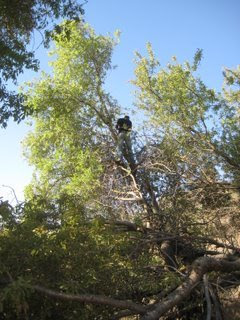The farmer’s land is located above Huwwara checkpoint, one of the largest checkpoints in Palestine. It is deep within Palestinian territory, separating Nablus from surrounding communities that depend on it for services, goods and employment. The farmer’s fields provide a clear view of the checkpoint.
 Higher up and overlooking the farmer’s land is the illegal Israeli settlement from which settlers come to harass him and his family.
Higher up and overlooking the farmer’s land is the illegal Israeli settlement from which settlers come to harass him and his family.
The farmer advised MPT and IWPS to look for a youth on a donkey when they arrived at Huwwara. Sure enough, coming toward them from a far edge of a checkpoint parking lot they saw a donkey and rider who met and led them up to the almond trees.
 The family arrived within minutes with necessary supplies and everyone got to work.
The family arrived within minutes with necessary supplies and everyone got to work. The boys of the family climbed up into the trees to knock the almonds down with sticks. Everyone else picked up the almonds that fell to the ground as well as what they could reach on the lower branches.
The boys of the family climbed up into the trees to knock the almonds down with sticks. Everyone else picked up the almonds that fell to the ground as well as what they could reach on the lower branches.

The morning passed pleasantly and peacefully. The settlers did not come to the farmer’s land that day, perhaps because it was Saturday, the Jewish Sabbath, or perhaps because there would be outside witnesses to their illegal actions. Whatever the reason, the family appreciated the company of internationals and was glad to harvest a section of land without interference.
Work stopped at noon while everyone shared lunch in the shade of a tree.

After lunch, the farmer sent his sons home on the donkeys, carrying sacks full of the almonds harvested in the morning. The boys returned later with a thermos of hot tea in the ever present Palestinian tradition of hospitality.

After enjoying tea together, the group continued working for another hour or so, until the heat made further work impractical.

Still, the donkeys had one more task before it was time for them to rest. The boys tied fallen tree branches together for them to drag home for firewood.

As the internationals from MPT and IWPS walked back to Huwwara checkpoint, they talked about what hard work farming is everywhere. They recognized, however, that most farmers do not work shadowed by a fear of violence everyday as do farmers throughout Palestine.
While our day had been peaceful, we were soon back at Huwwara, standing in line like cattle to have our IDs and our belongings checked by Israeli soldiers before being allowed to pass. For us such treatment is an occasional annoying inconvenience. For Palestinians it is all too often a daily source of frustration, humiliation and long delays.







































